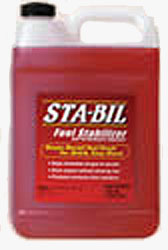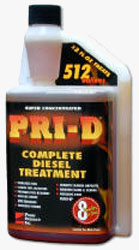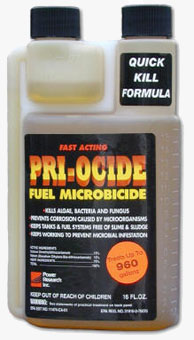Library Contents Search the Library RV Tech Library Help Page Site Map About Us Tiffin RV Network TRVN Classifieds Campground Reviews Photo Gallery TRVN Store
Appliances Batteries Boondocking/Dry Camping Chassis Clubs & Forums Electrical Electronics Engines Exterior Maintenance Generators Heating & Air Conditioning Interior Maintenance Misc Items Operating Tips Plumbing Red Bay Safety & Health Storage Supplier Contacts Tires and Wheel Rims Towing Transmissions Weighing

Diesel Fuel Additives



Gasoline versus Diesel:
We've all seen the results of letting gasoline sit around too long. Park your lawnmower in the fall without doing anything to it and when spring rolls around you'll have a lawnmower that's hard (or impossible) to start and a gas tank full of some foul smelling stuff that more closely resembles turpentine than gasoline. The fuel breaks down and varnish deposits will form in the carburetor, plugging things up pretty good. The same holds true for gasoline powered RVs. That why most RVers will treat their gas tanks with Stabil fuel stabilizer prior to winter storage.
Diesel Fuel Stabilizers:
Diesel fuel is different, however. It's not as volatile as gasoline so it doesn't go bad as fast. However, it is organic so it will start to deteriorate the minute it leaves the refinery, just not as fast as gasoline does. As it ages masses of carbon, gum, and resin form in your fuel. They don't burn as completely as pure fuel so you do get deposits forming in your combustion chambers and on the tips of your fuel injectors. You lose power, efficiency, and fuel economy with older fuel. If you are only leaving your RV stored for 5 months or less you probably don't need a fuel conditioner for diesel fuel. But, this will depend upon your climate. Because diesel fuel is organic, it will deteriorate more rapidly in a warm environment than in a cold environment. If you plan on storing your diesel fuel in a warm climate you may want to add a fuel conditioner to keep it from breaking down, even if stored for as little as 3 months.
Note that there is a difference between "stabilizers" and "conditioners". Not all fuel conditioners are designed to protect fuel over the long term. Many are designed to boost performance while running but will not protect against fuel degradation over time. Be sure to verify that any fuel conditioner you are looking at is designed to stabilize fuel while in storage. One popular fuel stabilizer is the PRI-D fuel treatment. For more information on this, as well as more detailed information and independent tests check out the Pri-Products website for more information.
Algae:
There is a greater problem when dealing with diesel fuel storage and it's something that gasoline engines don't have to deal with. Because diesel fuel is a heavier substance than gasoline and has no real vapors it is subject to algae. Small amounts of water will accumulate in diesel fuel. Most of this water comes from condensation in the tank area directly above the fuel level. That's why it's important to keep the fuel tank (on any vehicle) as full as possible during storage in order to minimize condensation. This condensation slides down into the fuel and remains suspended in it. Once it's there it acts as a breeding ground for microorganisms such as bacteria, fungi, and algae. These organisms feed off the hydrocarbons in your fuel (pretty tasty, huh) and create a waste product that is both corrosive and harmful. If there is sufficient quantity of this stuff in your tank you will be in for a surprise come spring. This gunk will begin to plug up your fuel filter and your engine will lose power and die. You may have to go through a whole lot of expensive fuel filters in order to filter all of the icky stuff out unless you have your fuel pumped and filtered externally. Either way, it's time consuming and expensive so you don't want to go there.
The best way to prevent this from happening is to add an algaecide to your fuel prior to storing your RV. Pri-Products makes Pri-Ocide, which does a great job but you'll find algaecides from other manufacturers at most major marine dealers. They're generally made by the same people who make fuel additives but not all truck stops stock an algaecide. An algaecide will float on the surface of your fuel and will also mix with any water found elsewhere in the fuel. It will kill any existing growth as well as provide a protective barrier against any future growth. The additive burns right up with your diesel fuel when you run your engine so if you run your engine regularly to exercise it in winter you may want to consider adding a bit more algaecide every now and then, depending upon how much fuel you burn and how small your tank is. Algae is also climate sensitive so storing your RV in Nome, Alaska over the winter is going to be better for the fuel than storing it in the Panama Canal over winter. Heat and humidity will foster growth of algae so this means more for you southern RVers than us snowbirds up in Wisconsin. Personally, I do add fuel additive and algaecide in November to my 150 gallon tank. I exercise the RV once a month and sometimes even get to drive it for a couple of hours rather than 15 minutes, depending upon the road conditions. I don't add any more algaecide under these conditions.
Submitted by Mark Quasius - 5/15/06
Click Your browser's "Back" button to return to the previous page
or chose another category from the side menu.
The RV Tech Library is brought to you by the TiffinRVnetwork
Absolutely No Affiliation exists between this group and Tiffin Motor Homes Inc or the Allegro Club. This website neither endorses or discourages the use or purchase of a Tiffin product. All references, suggestions, comments, etc. contained herein are the opinions/experiences of the posters and not those of Tiffin Motor Homes Inc. or the website administrators.



